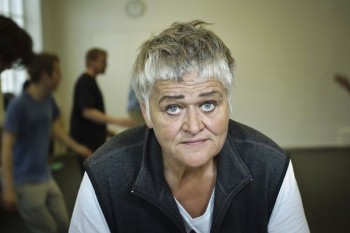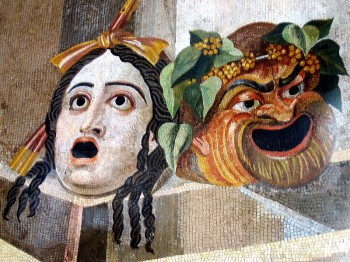Tag: theatre
In pursuit of a conscience
19 March 2012 | Drama, Fiction
‘An unflinching opera and a hot-blooded cantata about a time when the church was torn apart, Finland was divided and gays stopped being biddable’: this is how Pirkko Saisio’s new play HOMO! (music composed by Jussi Tuurna) is described by the Finnish National Theatre, where it is currently playing to full houses. This tragicomical-farcical satire takes up serious issues with gusto. In this extract we meet Veijo Teräs, troubled by his dreams of Snow White, who resembles his steely MP wife Hellevi – and seven dwarves. Introduction by Soila Lehtonen

Dictators and bishops: Scene 15, ‘A small international gay opera’. Photographs: The Finnish National Theatre / Laura Malmivaara, 2011
CAST OF CHARACTERS
Veijo Teräs
Hellevi, Veijo’s wife and a Member of Parliament
Hellevi’s Conscience
Rebekka, Hellevi and Veijo’s daughter
Moritz, Hellevi and Veijo’s godson
Agnes af Starck-Hare, Doctor of Psychiatry
Seven Dwarves
Tom of Finland
Atik
The Bishop of Mikkeli
Adolf Hitler
Albert Speer
Josef Stalin
Old gays: Kale, Jorma, Rekku, Risto
Olli, Uffe,Tiina, Jorma: people from SETA [the Finnish LGBT association]
Second Lieutenant, Private Teräs, the men in the company
A Policeman
Big Gay, Little Gay, Middle Gay
William Shakespeare
Hermann Göring
Hans-Christian Andersen
Teemu & Oskari, a gay couple
The Apostle Paul
Father Nitro
Winston Churchill
SCENE ONE
On the stage, a narrow closet.
Veijo Teräs appears, struggling to get out of the closet.
Veijo Teräs is dressed as a prince. He is surprised and embarrassed to see that the audience is already there. He seems to be waiting for something.
He speaks, but continues to look out over the audience expectantly.
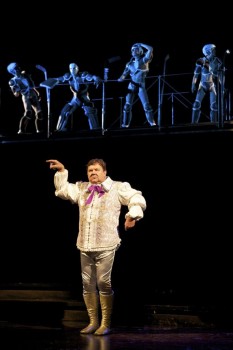
Snow White's spouse, Veijo (Juha Muje), and the dwarves. Photo: Laura Malmivaara, 2011
VEIJO
This outfit isn’t specifically for me, because… I mean, it’s part of this whole thing. This Snow White thing. I’m waiting for the play to start. Just like you are. My name is Veijo Teräs and I’m playing the point of view role in this story. Writers put point of view roles like this in their plays nowadays. They didn’t use to.
Just to be clear – this isn’t a ballet costume. I’m not going to do any ballet dancing, but I won’t mind if someone dances, even if it’s a man. Particularly if it’s a man. But I don’t watch. Ballet, I mean. Not at the opera house, or on television, or anywhere, and I have no idea why we had to bring up ballet – or I had to bring it up – because this is a historical costume, so it’s appropriate. This is what men used to wear, real men like Romeo and Hamlet, or Cyrano de Bergerac. But we in the theatre these days have a hell of a job getting an audience to listen to what a man has to say when he’s standing there saying what he has to say in an outfit like this. People get the idea that it’s a humorous thing, but this isn’t, this Snow White thing, where I play the prince. Snow White is waiting in her glass casket, she died from an apple, which seems to have become the Apple logo, Lord knows why, the one on the laptops you see on the tables of every café in town. More…
Best theatre, best play
16 March 2012 | In the news
On 11 March Finland’s theatre organisations gave their awards to last year’s best theatres and theatre-makers. Theatre of the Year was the Finnish National Theatre: according to the jury, it has both ‘opened all its doors, from cellar to attic’ and also left the building to make theatre and offered space for initiative. Audience figures have risen by more than 50,000, and the theatre’s repertoire has ‘cut keenly into the life and reality of contemporary audiences and the key national questions behind them without becoming bogged down in familiar stereotypes.’
The Finnish Dramatists’ Union awarded its Lea Prize for the Playtext of the Year, worth €5,000, to Pirkko Saisio’s HOMO! (This is Saisio’s fourth Lea Prize since 1986.) HOMO! is currently running, in a musical, or rather, operatic form in the National Theatre, in a production directed by the playwright herself; the composer is Jussi Tuurna.
In art as elsewhere, it is worth thinking about things from new angles – a few years back, for example, the National hardly did any musical theatre at all. (However, the company of actors in no way hinder the staging of musical theatre: under Tuurna’s direction, the entire cast burst into spectacular flower, alone and in chorus.) Besides, musical theatre was thought to be the province of the Helsinki City Theatre, where imported commercial musicals (Cats, Les Miserables, Mary Poppins etc) have lately represented a considerable part of the theatre’s income. On this production line, however, there are few chances for writers, composers and other theatremakers to develop a specifically Finnish musical theatre.
The Finnish National Theatre’s most recent success, Kristian Smeds’s Mr Vertigo also used original music, produced by young jazz musicians, which was on exactly the same wavelength as the text and its interpretation.
Success after success
9 March 2012 | This 'n' that
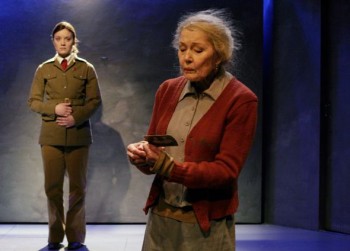
The women of Purge: Elena Leeve and Tea Ista in Sofi Oksanen's Puhdistus at the Finnish National Theatre, directed by Mika Myllyaho. Photo: Leena Klemelä, 2007
Sofi Oksanen’s Purge, an unparalleled Finnish literary sensation, is running in a production by Arcola Theatre in London, from 22 February to 24 March.
First premiered at the Finnish National Theatre in Helsinki in 2007, Puhdistus, to give it its Finnish title, was subsequently reworked by Oksanen (born 1977) into a novel – her third.
Puhdistus retells the story of her play about two Estonian women, moving through the past in flashbacks between 1939 and 1992. Aliide has experienced the horrors of the Stalin era and the deportation of Estonians to Siberia, but has to cope with the guilt of opportunism and even manslaughter. One night in 1992 she finds a young woman in the courtyard of her house; Zara has just escaped from the claws of members of the Russian mafia who held her as a sex slave. (Maya Jaggi reviewed the novel in London’s Guardian newspaper.) More…
Praise and prize for theatre on the edge of Europe
29 April 2011 | In the news
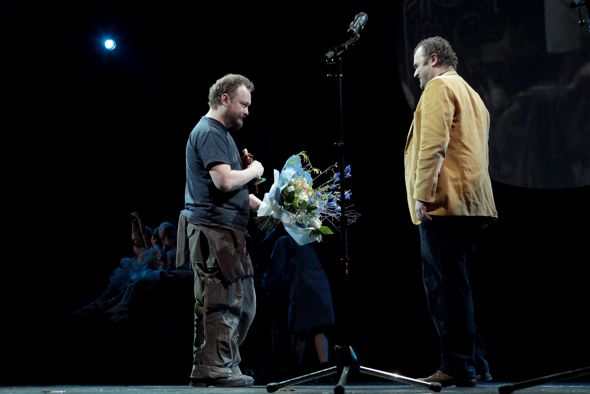
Kristian Smeds is awarded the XII Europe Prize of New Theatrical Realities in St Petersburg on 17 April, presented by a previous prize-winner, Italian theatremaker Pippo Delbono. Photo: rossetti/phocusagency
Theatremaker Kristian Smeds (born 1970) was awarded the XII Europe Theatre Prize for New Theatrical Realities in St Petersburg on 17 April. The prize, worth 30,000 euros, was – this time – divided between six prominent theatremakers or theatre groups. (For more information, see the Premio Europa website.)
The international prize jury consists of representatives of many institutions of the field. Since 1986 the main prize, the Europe Theatre Prize (worth 60,000 euros), has been awarded to 14 European theatremakers considered influential – among them, the directors and/or writers Ariane Mnouchkine, Peter Brook, Heiner Müller, Lev Dodin, Harold Pinter, and now, the German director Peter Stein. More…
Is it a play, is it a book?
25 February 2011 | This 'n' that
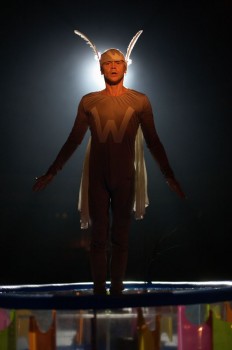
On the way to fame: Walt the Wonder Boy in Kristian Smeds's stage adaptation of Paul Auster's novel Mr. Vertigo at the Finnish National Theatre (2010). Photo: Antti Ahonen
Dramatisations of novels are tricky. Finnish theatremakers like adapting novels for the stage, which often results in a lot of talking instead of action – and action here doesn’t refer to just physical movement but to the subtext, to what happens under and behind the words.
Currently an adaptation of an American novel is running on the main stage of the Finnish National Theatre in Helsinki. Mr Vertigo (1994), Paul Auster’s seventh book, tells the story of an orphan boy in the 1930s St Louis. After harsh years as the long-suffering apprentice of the mysterious Master Yehudi, Walt becomes the sensational Wonder Boy by learning how to levitate.
In theatremaker Kristian Smeds’s adaptation, Auster’s whimsical, rambling novel becomes a capricious, illusory journey about illusions, freedom, and the unattainability of love. Walt (the highly expressive, athletic Tero Jartti) interprets, with hilarious comedy as well as with touching desperation, both the dizzyingly powerful experience of creativity and the ridiculous hubris of the artist. More…
On stage in New York
28 May 2010 | In the news
Puhdistus (2007), a play by Sofi Oksanen that also became a award-winning novel (2008), will be produced at the prestigious La MaMa theatre in New York in February 2011 under the title Purge. The director is Zishan Ugurlu, La MaMa’s Artistic Director.
Next month, Purge will be read in Chicago where the conference of the Theatre Communication Group of American professional theatres takes place. In September the play – which is set in 20th-century Estonia – will also be prèmiered in Tartu, Estonia. The novel was published in Estonian translation last year. Purge was published in English this April by Grove/Atlantic, translated by Lola Rogers. So far translation rights have been sold to 28 countries.
The play has been translated into English by Eva Buchwald, dramaturge at the Finnish National Theatre, where Purge was first produced in 2007. No Finnish play has ever before been produced on a professional stage in the US.
Drama news
20 May 2010 | In the news
A new internet service aims to provide information about Finnish drama and its writers.
Finnishplays.com is operated by the Finnish Dramatists’ Union, which has entered into partnerships with international drama agents in order to promote Finnish plays.
This year, Finnish plays that are to be performed abroad include Sofi Oksanen’s Purge (Puhdistus; Oksanen’s multi-prize-winning novel (you’ll find a sample from the English translation, by Lola Rogers, through the link) began life as a play at the Finnish National Theatre, appearing in print a year later), Reko Lundán’s Unnecessary people (Tarpeettomia ihmisiä), to be performed in Estonia and in Hong Kong, and Sirkku Peltola’s The Finnhorse (Suomenhevonen), in Iceland.
The website also features a catalogue of plays in translation, plus a search service for Finnish plays in various languages.
Finnish theatre doesn’t travel easily, never has – it’s a long way from here down to European theatre festivals, for example, taking place mostly in the south. But Finnish drama has began to travel more than ever, as new translations of plays into various languages have been made – and they, in turn, have made their way into theatres, in Europe and in the United States.
Nordic Drama Award for Heini Junkkaala
14 May 2010 | In the news
On May 7 playwright Heini Junkkaala (born 1975) received the bi-annual Nordic Drama Award (worth €5,000), presented by the Nordic Theatre Union.
Her play Kymmenen tikkua laudalla (‘Ten sticks on a board’, 2008) is a drama for children spanning three generations that contains both realistic and fantastic elements. Junkkaala’s latest play, Kristuksen morsian (‘Bride of Christ’), about religion and homosexuality, was premièred at the Finnish National Theatre in March.
The last two winners of the award were also Finns: Juha Jokela received it for his play Fundamentalisti (The Fundamentalist) in 2008, and Kari Hotakainen won the prize for his play Punahukka (Border Crossing) in 2006 (both have been translated into English; introductions in English are available here; click Translations of Finnish drama).

